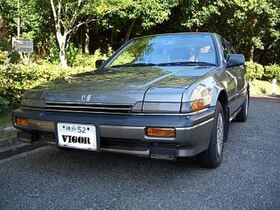Honda Vigor
| Honda Vigor | |
|---|---|
 |
|
| Overview | |
| Manufacturer | Honda |
| Production | 1981-1995 |
| Body and chassis | |
| Class |
Compact car (1981–1995) Mid-size (1989–1995) |
| Related |
Honda Accord Honda Inspire |
| Chronology | |
| Successor | Acura TL (United States & Canada) |
| Honda Vigor | |
|---|---|
 |
|
| Overview | |
| Also called | Honda Accord 2nd gen |
| Production | 1981–1985 |
| Assembly | Sayama, Saitama, Japan |
| Body and chassis | |
| Class | Compact |
| Body style | 3-door hatchback 4-door sedan |
| Powertrain | |
| Engine | 1.8 L EK1 I4 CVCC-II carburetor 1.8 L ES3 I4 PGM-FI |
| Transmission | 4-speed Hondamatic automatic 5-speed manual |
| Dimensions | |
| Wheelbase | 2,450 mm (96.5 in) sedan |
| Length | 4,410 mm (173.6 in) sedan |
| Width | 1,650 mm (65.0 in) sedan |
| Height | 1,375 mm (54.1 in) sedan |
| Honda Vigor | |
|---|---|
 |
|
| Overview | |
| Also called | Honda Accord 3rd gen |
| Production | 1986–1989 |
| Assembly | Sayama, Saitama, Japan |
| Body and chassis | |
| Class | Compact |
| Body style | 4-door sedan |
| Powertrain | |
| Engine | 1.8L A18A I4 1.8L B18A I4 2.0L B20A I4 120 hp (89 kW) |
| Transmission | 4-speed automatic 5-speed manual |
| Dimensions | |
| Wheelbase | 2,600 mm (102.4 in) |
| Length | 4,535 mm (178.5 in) |
| Width | 1,695 mm (66.7 in) |
| Height | 1,355 mm (53.3 in) |
| Honda Vigor (3rd generation) | |
|---|---|
 |
|
| Overview | |
| Manufacturer | Honda |
| Also called | Acura Vigor Honda Inspire |
| Production | 1992–1994 (Acura) 1989–1995 (Japan) |
| Assembly | Sayama, Saitama, Japan |
| Body and chassis | |
| Class |
Mid-size (Int'l) compact (Japan) |
| Body style | 4-door "B" Pillar hardtop |
| Layout | Longitudinal front-engine, front-wheel drive |
| Related |
Honda Rafaga Honda Inspire Honda Ascot |
| Powertrain | |
| Engine | 2.5 L G25A1 I5 2.0 L G20A1 I5 |
| Transmission | 4-speed automatic 5-speed manual |
| Dimensions | |
| Wheelbase | 2,805 mm (110.4 in) |
| Length | 4,690 mm (184.6 in) (Japan) 4,836 mm (190.4 in) (Acura) |
| Width | 1,695 mm (66.7 in) (Japan) 1,781 mm (70.1 in) (Acura) |
| Height | 1,355 mm (53.3 in) (Japan) 1,369 mm (53.9 in) (1992 Acura) 1,321 mm (52.0 in) (1993-94 Acura) |
| Chronology | |
| Successor |
Acura TL Honda Saber |
The Honda Vigor was a premium sedan that was sold in Japan through the Honda Verno dealer network from 1981 to 1995 derived from the Honda Accord, and briefly sold in North America from 1992 to 1994 as the Acura Vigor. Early Vigors were more upmarket versions of the Accord and served as Honda's flagship until the arrival of the Honda Legend. In 1989, the Vigor would differentiate itself further from the Accord with unique styling and an available longitudinal five-cylinder engine, and a twin to the Vigor was introduced with the Honda Inspire, available at Honda Clio dealerships.
It was replaced in North America with the Acura TL and in Japan with the Honda Saber/Inspire, which were the same vehicle sold through different networks.
The Vigor was developed during what was known in Japan as the Japanese asset price bubble or "bubble economy".
Beginning September 25, 1981, Honda produced a variant of the Honda Accord badged as the Honda Vigor for Japan only. The first generation Vigor was a higher grade 4-door sedan and 3-door hatchback, with the 1.8 L engine as the only engine available, using Honda's CVCC-II system. The Vigor was a sportier, faster, "vigorous" Accord with a higher level of equipment over the more sedate Accord. Due to the higher level of luxury oriented equipment, the Vigor help "set the stage" for the market to accept a luxury equipped car from Honda, which appeared in 1985 with the Honda Legend. The Vigor competed with the Toyota Chaser and the Nissan Laurel in Japan. The rear lighting implementation consisted of the license plate installed in the bumper, with a black trim piece between the rear tail lights and the word "Vigor" inscribed. The Accord installed the rear license plate between the rear tail lights.
This engine used the SOHC 3-valve-per-cylinder CVCC-II setup, mated to a 5-speed manual or 4-speed automatic transmission with a lockup torque converter. Vehicles with a manual transmission and the CVCC carburetor earned 13.6 km/L (38 mpg‑imp; 32 mpg‑US) based on Japanese Government emissions tests using 10 different modes of scenario standards, and 110 PS (80.9 kW; 108.5 bhp), and 23 km/L (65 mpg‑imp; 54 mpg‑US) at consistently maintained speeds at 60 km/h (37.3 mph). Vehicles with PGM-FI earned 13.2 km/L (37 mpg‑imp; 31 mpg‑US) based on Japanese Government emissions tests using 10 different modes of scenario standards, with 130 PS (95.6 kW; 128.2 bhp), and 22 km/L (62 mpg‑imp; 52 mpg‑US) consistently maintained speeds at 60 km/h (37.3 mph). Japanese buyers were liable for a higher level of annual road tax over other Honda products with smaller engines.
...
Wikipedia
